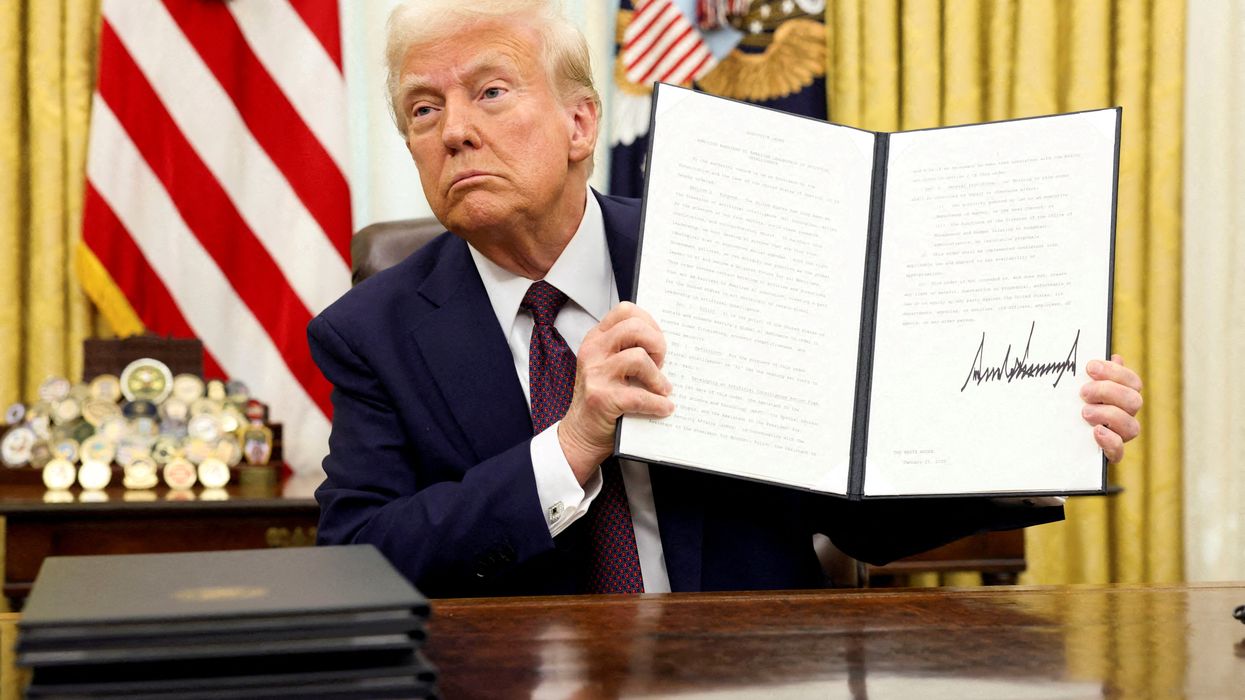Yesterday Trump rescinded an order he had made late Monday night that froze up to $3 trillion in federal grants and loans.
That order had caused wild confusion across America.
Hospitals, schools, nonprofits, research organizations, preschool programs, and police departments wondered if they had lost federal financial support.
The Medicaid system that provides health care to millions of low-income Americans was interrupted.
Earlier this week, a federal judge temporarily blocked the order in response to lawsuits claiming that Trump had no authority to freeze funds appropriated by Congress.
Attorneys general in 22 states and the District of Columbia had joined together to stop the order.
So, yesterday, in the midst of this chaos, Trump’s acting director of the Office of Management and Budget, Matthew J. Vaeth, notified federal agencies that the Monday night order had been “rescinded.”
What are we to make of this?
The scale of the order was wildly broad.
It argued that federal spending must be aligned with “Presidential priorities” while reviews were undertaken and gave officials until February 10 to report to the Office of Management and Budget. By then, the OMB would likely be run Russ Vought, Trump’s nominee — and, not incidentally, the chief author of Project 2025, the blueprint for Trump’s takeover of the U.S. government.
My betting is we’ll see another version of Monday night’s order once Vought is installed. It will be somewhat more detailed to avoid the confusion of the first attempt. But the Trump White House views the order as essential.
It’s part of a much larger plan.
Last week, in a separate initiative, Trump barred certain spending he disagreed with, including programs involving “diversity, equity and inclusion” and nongovernment organizations he believes undermine the national interest.
He also ordered a 90-day freeze on all foreign aid spending, which has jeopardized congressionally authorized foreign assistance including military aid to Ukraine and the distribution of medications in Africa and developing nations.
All of this, as I’ve pointed out, is illegal under the 1974 Impoundment Control Act.
Apparently, Trump wants the current Supreme Court to reverse its 1974 ruling — something that the court rarely does, especially when the original decision was unanimous. (But the current Supreme Court has few compunctions about reversing itself. See: Dobbs vs. Women’s Health Organization.)
Meanwhile, Trump has sent a memo to all 2.3 million federal employees that they will be paid for eight months if they resign before February 6. Otherwise, they risk being furloughed (that is, not being paid) or fired.
The likely author of this memo is Elon Musk, the richest person in the world, whom Trump tapped to become head of the so-called department of government efficiency.
When Musk fired 80 percent of Twitter’s employees on taking over the firm in 2022, he used the same language that headed this week’s memo to federal employees: “A fork in the road.”
But these new initiatives are not about shrinking the size of the federal government. They’re about centralizing control of the federal government in Trump’s hands. Trump aims to put people into these jobs who are more loyal to him than they are to the United States.
Trump’s attempted takeover of the U.S. government is itself part of a larger strategy to replace American democracy with an oligarchy.
The basic equation throughout history is that concentrated power promotes concentrated wealth, just as concentrated wealth promotes concentrated power. The two are symbiotic.
Musk and his billionaire buddies need Trump as much as Trump needs Musk and his billionaire buddies. America and American democracy need neither.
NOW READ: Trump supporters finally finding out why you shouldn't vote for a criminal corporate raider
Robert Reich is a professor of public policy at Berkeley and former secretary of labor. His writings can be found at https://robertreich.substack.com/.


